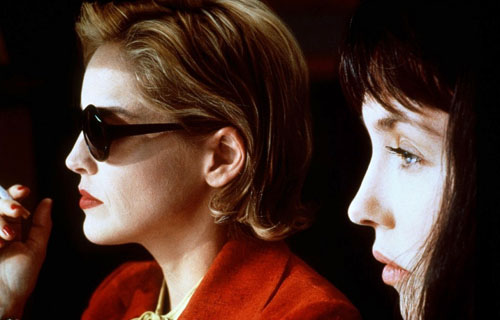
Over the last few months, the Northwest Film Center has screened—and will continue to screen—films for the class/film series “Literature into Film.” The course is exactly what its title sounds like, offering a deeper look into the way directors, producers and screenwriters interpret and transform words on the page for the silver screen.
This evening, the center will offer another screening in the series—the 1996 film Diabolique, starring Sharon Stone and Isabelle Adjani.
Like so many movies from the ’90s, Diabolique revolves around murder and the scandal and aftermath that accompany it.
This version involves a murder triangle in which the points are the fragile wife, the willful mistress and the abusive husband. All three work together at a boarding school for troubled boys: The wife and mistress are both teachers and, oddly enough, very good friends. The wife is very much aware of her husband’s affairs and the abusive husband doubles as a sadistic dean.
The wife, Mia (Adjani), and the mistress, Nicole (Stone), have both come to loathe the husband, Guy (Chazz Palminteri), and by some roundabout logic come to the conclusion that the only way they’ll ever reach peace in their lives is by killing the monstrous Guy.
So, the ladies lure him into Nicole’s home under the pretext that Guy and Mia will discuss a divorce.
Prior to the meet-up, Nicole has laced a bottle of scotch with a drug that renders the recipient unconscious. Guy downs a few drinks and, after a brief scuffle, is knocked out.
The ladies take his consciousness all the way out by drowning him in the tub. When the deed is done, they return him to school grounds and dispose of the body in the pool, making it look like a tragic drunken accident.
Shortly after the completion of the scheme, strange events keep happening: the body goes missing from the pool, the suit Guy was wearing the night he died is returned to his office and pictures of the women disposing of the body appear.
Police Detective Shirley Vogel, played by the ever-charismatic Kathy Bates, begins looking into the matter. As every character in the movie has realized, something about this whole situation stinks.
The two ladies grow increasingly disconcerted and frantic, resulting in hectic events, multiple twists at the ending and murders that aren’t quite what they seem.
The film is based on the 1952 novel Celle Qui N’Etait Plus, roughly translated as The One That Was Not, by the crime-writing duo Pierre Boileau and Thomas Narcejac under the pen name Boileau-Narcejac.
The twosome have contributed to many other famous films with their writing, including Vertigo, Eyes Without a Face and the original adaptation of Les Diaboliques.
Now, I’ve never seen the original, but from what I’ve heard the two differ greatly: The 1996 version has the feel of a typical ’90s crime thriller, whereas the French 1955 model has more of a Hitchcock-ean vibe. (The British “Master of Suspense” originally wanted to buy the rights to the film, but Boileau-Narcejac instead let him work his magic with Vertigo.)
With the exception of Kathy Bates, whose character ultimately has no significant purpose, the acting in the remake is subpar to say the least; it’s my biggest complaint about this film. I have no other version of the characters in my mind to compare it to, though, so my standards may be lower than others.
Even though Stone plays a part that appears to mirror her real-life personality, her delivery of her lines is forced. Adjani pulls a Carrie Fisher circa A New Hope and switches between accents: It gets to the point where bets could be made about whether she’ll put on her fake American accent or her native French accent in each scene.
The newer version, though far less popular and acclaimed than its predecessor, stays truer to the novel than the original did, according to NWFC “Literature into Film” professor Pietro Ferrua.
Diabolique
Tuesday, May 21, 7 p.m.
Whitsell Auditorium
1219 SW Park Ave.
$9 general admission
The fact that the 1996 version was more accurate is one of the main reasons it was chosen to represent one of the many books that have made their way into film form.
Ferrua’s has taught since the 1970s: He taught literature at Lewis & Clark College and eventually designed the curriculum for “Literature into Film,” which was considered an experimental course at first.
“The idea was to study how faithful and creative the adaptation was in comparison to the writings,” Ferrua said, “as well as to study how the two diverge or combine content.”
The discussions after screenings offer insight into “cultural interrelations,” as Ferrua put it, allowing audiences to study how different forms of art, culture and expression can all be intertwined in a way that isn’t normally observed in the everyday classroom setting.

